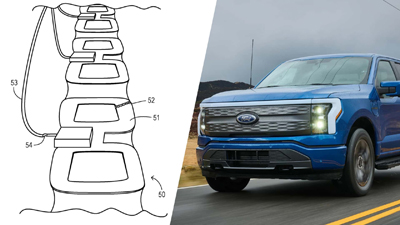A recent Ford patent granted by the U.S. Patent and Trademark Office (USPTO) shows how the American auto giant is thinking about charging all-electric vehicles in the future, and it’s interesting and questionable at the same time.
First seen by Green Car Reports, the patent application describes how coils connected to a source of electricity could be embedded in the road surface to transmit power wirelessly to receivers mounted on EVs driving along.
Titled “Roadway Charging Coil Alignment and Monitoring,” the application, originally filed Jan. 20 and published July 20, proposes equipping the vehicles with ground penetrating radar to detect the embedded coils and automatically steer them, maximizing the charging power by precisely aligning the in-road coils with the vehicle’s receiver.
The detailed description reads as follows:
“The invention optimizes inductive coupling between vehicle-mounted receiving coils and roadway-embedded transmission coils in order to maximize a vehicle charging rate while driving at speed on a roadway.
"Ground penetrating radar (preferably Ultra-Wideband or UWB radar) detects and maps out the embedded charging coils so that a vehicle path can be laid out with the optimal charging capacity. A detection range of the radar extends beyond the charging coil presently beneath a vehicle, potentially beyond the next few coils in the travel direction of the vehicle.”
It’s an interesting proposal that could lead to EVs having smaller batteries, which in turn can make the vehicles much lighter and more efficient, considering they could be charged on the go. But it’s not without its flaws, the biggest of them being the potential costs of putting copper wire in the roads.
Another potential problem is the limited output current dynamic wireless charging solutions are capable of providing---most offer between 11 and 20 kW---but even those are still at the experimental level. A bigger average transfer rate of 70 kW was achieved on a segment of a one-mile test road in Sweden in 2021, where Israeli startup ElectReon successfully tested its technology at various speeds of up to 37 miles per hour on a 40-ton truck.
A more recent test, performed by Stellantis in Italy using the same ElectReon in-road tech, saw a Fiat 500e drive while being dynamically and wirelessly recharged on a stretch of road about 6/10ths of a mile long.
This isn’t the first time Ford got a patent for new EV tech. In July, it filed an application for a portable charging trailer that could power the EV towing it, and in June it filed another patent that describes a roof-mounted backup battery pack.










Abby Andrews